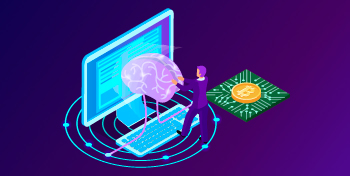Have you ever wondered: “What is a smart contract?”. If yes, then you are right to read this, because we offer you a complete guide to smart contracts. To learn more about them, let’s get acquainted with their definition.
And so, a smart contract is a digital code used to exchange assets, including shares, money or property, without the participation of any intermediaries.
From a technical point of view, it is an automated or self-executing contract that contains an agreement between two parties concluded using code. The smart contract is distributed, decentralized and transparent because it works on blockchain technology.
The absence of intermediaries makes it an amazing concept, since it can function automatically. A better comparison to this in the real world would be the documents provided by lawyers.
The ability of smart contracts to embed rules, both positive and negative, is very useful in almost any environment.
The path to the concept of a smart contract
The idea of a smart contract is not new. In fact, according to Coinmarketrate.com, it was first proposed by Nick Szabo two decades ago.
According to him, smart contracts are a set of promises specified in digital form. Nick Szabo is a computer scientist and cryptographer, so he worked on two key topics: digital currency and digital contracts.
Thanks to his work, the concept of smart contracts was created, where he sought to bring this concept to improve the highly developed practice of contract law for Internet users. E-commerce can use this development and implement it.
The concept has evolved over the years, but its true embodiment was first noticed when the blockchain appeared. When Bitcoin was released, it was equipped with support for smart contracts, but allowed only simple smart contracts to be created and executed. It was Ethereum that secured their use in real conditions.
The founder of Ethereum is Vitalik Buterin, and this brings us to a very interesting question: who invented smart contracts?
Who invented smart contracts
Nick Szabo invented the concept of smart contracts. His work was related to cryptography. He is an American computer scientist.
In 1998, he worked on Bit Gold, a cryptocurrency. In Bit Gold, smart contracts were defined as a computerized transaction protocol that could be defined through a contract for execution purposes.
Many people confuse Vitalik Buterin with the founder of the concept of smart contracts, but this is not the case. He presented the optimal way to use smart contracts in blockchain technology, no more.
Blockchain Smart Contract
Now that we know about the origin of the smart contract, it’s time to consider blockchain-based smart contracts.
Satoshi Nakamoto released the first cryptocurrency in 2008 – Bitcoin. It was based on the revolutionary blockchain technology. The Bitcoin protocol could only be used to create simple smart contracts.
But there were many teams around the world that worked on the technology and implemented smart contracts in Bitcoin. One of these commands is Particl.io, an e-commerce platform using blockchain at its core. They have implemented an intelligent smart contract in Bitcoin that takes care of the funds stored in escrow.
Another group also succeeded in ensuring the operation of an effective smart contract in the BTC network. They released the FASTKITTN framework, which solved the problem of complex management of smart contracts in a BTC.
They also solved the problem of the costs associated with launching smart contracts in the Bitcoin network. They discussed the whole process of this in their scientific article “Practical smart contracts in Bitcoin”.
They used trusted computing environments (TEE) to solve the problems. In addition, there they managed to launch a smart contract off-chain, which led to an effective way to execute them with complete security.
Ethereum Smart Contract
Ethereum has changed the way smart contracts work in the blockchain environment. It was designed with this in mind. And that is why smart contracts are effective in the Ethereum ecosystem.
Currently, Ethereum is the number one choice for creating smart contracts.
But let’s take a closer look at how they work.
Vitalik Buterin at the DC Blockchain Summit described smart contracts as a way to transfer assets or currency in the program. He also added that the program executes the code based on the conditions defined in it. It does this automatically and verifies the information based on the data received.
The smart contract is executed when the condition is met. If the condition is not met, the smart contract will be executed based on the specified condition.
Another important point he mentioned is that a decentralized registry creates copies of a smart contract or document to ensure immutability and security.
Things that he described may be too technical for beginners in this field, so we’ll look at an example below.
If in the distant future you decide to buy real estate using a blockchain-based platform, you will be able to see smart contracts in action.
So, the future, you and real estate. You saw the property, you liked it and decided to buy it.
There are many parameters that need to be taken care of during a real estate transaction. For example, you need to set the loan amount, installment time and other unique conditions.
Based on a smart contract, it looks like this: you need to sign it, and set it in motion.
For example, you decided to pay an advance of 20% of the value of the property. After that, you decided to pay the rest of the property value in installments and other conditions that you may have.
The seller creates a smart contract based on the agreed terms. The intellectual contract is set in motion as soon as you both decide that everything is done correctly. Over time, you will pay contributions, and this will be fixed in the smart contract.
Ownership of the property passes to you after all payments are transferred to the seller. Everything happens automatically, without the intervention of any intermediaries or parties.
Compared to a real estate transaction made in the traditional way, you can save time, effort and nerves to complete the entire transaction.
Both the buyer and the seller save money because there are no intermediaries.
In addition, the smart contract will notify all related parties as soon as any event occurs in it, including banks, buyers, sellers and the insurer.
Technical example of a smart contract
After reading all this, you must be inspired by the possibilities associated with smart contracts. Moreover, in order to better understand what smart contracts can do and achieve, let’s look at them based on Ethereum.
Azure has provided a good collection of samples on its GitHub page.
To ensure proper work with high-quality assets, it is important to include two more participants besides the buyer and seller: an appraiser and an inspector. The inspector is responsible for checking the assets before the buyer makes a purchase.
The appraiser acts on the part of the seller, making the assets significant for buyers, and also facilitates the sale.
Currently, the smart contract that we are going to discuss includes 10 states, including:
- Active
- The offer has been placed
- Awaiting verification
- Inspected
- Rated
- Conditional acceptance
- The seller accepted
- Accepted
- Discontinued
The workflow is complicated, so we won’t discuss it here.
Advantages of smart contracts
By this point, you should already have a good understanding of what a smart contract is and how it works. Now we will look at their advantages and what they can offer in general.
- Security
Smart contracts provide a secure environment for the execution of contracts. This protects contract details and other key information from being leaked. Moreover, neither third parties nor people influence their execution, which makes them free from hackers. To ensure security, all critical information is protected using cryptography.
- Autonomy
Smart contracts are autonomous, which takes their functionality to a whole new level. Once smart contracts are deployed, they can be executed and completed independently without any intervention.
- Without interruption
Their operation cannot be interrupted by a third party if it is not intended for this initially.
- No trust
They provide a trusting environment in which the interests of all parties are protected.
- Cost-effective
They are cost-effective because they are autonomous and do not require intermediaries.
- Fast operation
Smart contracts work fast. A contract can be executed within minutes compared to hours when it comes to real contracts based on documents.
Problems and difficulties
Like any other technology, smart contracts are not free from problems and difficulties. In fact, the market is developing, and many companies are looking for ways to implement Blockchain technology. In fact, the introduction of smart contracts is hindered by the fact that blockchain technology is not mature.
Yes, blockchain technology is still in its infancy.
The main challenges facing the world of smart contracts include the following:
- Acceptance curve
The fact that the blockchain is in its infancy also affects the adoption of smart contracts. In addition, enterprises need to overcome many difficulties for their implementation, since they primarily need a decentralized network.
- Legal and regulatory acts
Any smart contract application must comply with regulations based on the ecosystem and the place where it is to be executed.
- Not standardized
Smart contracts are still not standardized, and many approaches and solutions are available on the network.
- Learning curve
Blockchain and smart contracts are not easy to master. Thus, the developer must not only be able to write code, but also understand the legal side of the code that he writes for the contract. In addition, judges and legal agencies should be able to understand the code either on their own or with the help of interpretations.
- Complexity of the business ecosystem
Smart contracts are not adhocs that can be added to the system. This makes it impossible to add or execute them, especially in a complex business ecosystem.
- Data Privacy
The blockchain is immutable. This is not in favor of data privacy laws, which are established for various geographical reasons in different countries of the world. For insurance, GDPR is an opportunity for the user to make the system forget about it. Currently, work is continuing to make the blockchain as flexible as possible without losing its key points.
In addition, there is competition that prevents smart contracts from becoming viable. The parties are fighting to determine the middle point and influence the whole process.
And finally, there are people’s expectations that can lead to problems because blockchain or other related technologies are simply not mature enough or popular enough in the market. It will take a long time before it is accepted.


